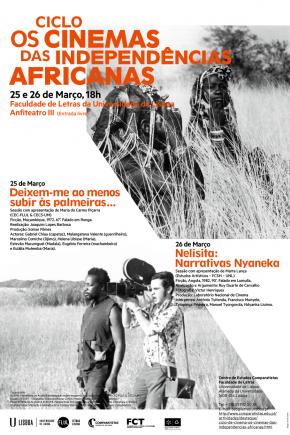 Organizado por: Aleph - Plataforma de Acção e Investigação sobre Imagens (Anti-)coloniais – CITCOM-CEC-FLUL & CECS-UMGrupo CITCOM - Cidadania, Cosmopolitismo Crítico, Modernidade(s), (Pós-)Colonialismo / Projecto DESLOCALIZAR A EUROPA: Perspectivas Pós-coloniais na Antropologia, Arte, Literatura e História (Cultura Visual, Migração e Globalização & Comparando Impérios: Iconografias Coloniais Comparadas)
Organizado por: Aleph - Plataforma de Acção e Investigação sobre Imagens (Anti-)coloniais – CITCOM-CEC-FLUL & CECS-UMGrupo CITCOM - Cidadania, Cosmopolitismo Crítico, Modernidade(s), (Pós-)Colonialismo / Projecto DESLOCALIZAR A EUROPA: Perspectivas Pós-coloniais na Antropologia, Arte, Literatura e História (Cultura Visual, Migração e Globalização & Comparando Impérios: Iconografias Coloniais Comparadas)
25 e 26 de Março, 18h Anfiteatro III, Faculdade de Letras da Universidade de Lisboa (Entrada livre)
25 de Março
Deixem-me ao menos subir às palmeiras…
Sessão com apresentação de Maria do Carmo Piçarra (CEC-FLUL & CECS-UM) Ficção, Moçambique, 1972, 67’. Falado em Ronga.
Realização: Joaquim Lopes Barbosa; Produção: Somar Filmes; Actores: Gabriel Chiau (capataz), Malangatana Valente (guerrilheiro), Marcelino Comiche (Djimo), Helena Ubisse (Maria), Estevão Macumguel (Madala), Eugénio Ferreira (machambeiro) e Eulália Mutemba (Maria).
Deixem-me ao menos subir às palmeiras…(1972), de Joaquim Lopes Barbosa (n. 1944), foi proibido pelo regime do Estado Novo. Como tal, antes do 25 Abril de 1974 nunca teve estreia comercial. Depois disso, raramente foi projectado, tendo permanecido praticamente desconhecido do público e sido pouco referenciado na história do cinema.O poema Monangamba do angolano António Jacinto (1926-1991), que descreve as duras condições de vida dos trabalhadores negros contratados, foi a primeira inspiração para a realização deste filme. Uma segunda influência foi o conto Dina, do moçambicano Luís Bernardo Honwana (n. 1942), publicado na obra Nós matámos o cão tinhoso.
Pela primeira vez na história do cinema português, um filme de ficção falado em Ronga, foi interpretado quase exclusivamente por negros, para cuja participação foi determinante a colaboração de Malangatana Valente (1936-2008). A todos os actores foi pedido que “exprimissem essencialmente o que sentiam e como viviam os seus conterrâneos – o que lhes era familiar”. As sequências iniciais que retratam os trabalhadores são documentais.
Passado numa machamba, o enredo do filme centra-se na figura de um capataz que submete os trabalhadores a trabalhos duros que culminam, frequentemente, no colapso dos mais fracos. Um dia, o capataz violenta sexualmente Maria, filha de Madala. Incitado à revolta, Madala não só não reage à ofensa como aceita a garrafa de vinho que o capataz lhe oferece. Acaba por sucumbir ao sofrimento, físico e emocional, o que provoca a revolta dos trabalhadores.
26 de Março
Nelisita: Narrativas Nyaneka
Sessão com apresentação de Marta Lança (Estudos Artísticos – FCSH – UNL)
Ficção, Angola, 1982, 90’. Falado em Lumuíla.Realização e Argumento: Ruy Duarte de Carvalho; Fotografia: Victor Henriques; Produção: Laboratório Nacional de Cinema; Intérpretes: António Tyitenda, Francisco Munyele, Tyiapinga Primeira, Manuel Tyongorola, Ndyanka Liuima.
Nelisita, filmado em 1980 na Chibia, quando os sul-africanos invadiam o Sul de Angola, seguiu-se à série Presente angolano-tempo Mumuíla, que Ruy Duarte terá filmado dois anos antes, na mesma geografia, com a mesma sociedade mas em registo de documentário.
Nelisita, com direito a prémio no FESPACO, festival pan-africano de cinema e televisão de Ouagadougou, Burquina Faso, e crítica nos Cahiers du Cinéma, marcaria o último fôlego do breve momento de entusiasmo do cinema angolano que, depois disso, caiu num longo marasmo. O argumento foi estruturado a partir de peças de literatura oral das populações Nyaneka do Sudoeste de Angola, em que elementos da comunidade actuam encenando as próprias lendas.
A fome domina o mundo e apenas restam vivos dois homens com as suas famílias. Um deles parte em busca de comida e encontra um armazém onde certos espíritos guardam enormes quantidades de géneros alimentícios e roupas. Neste contexto, o filme reflecte sobre as tentações da modernidade e a resistência às mesmas, observando a harmonia entre pessoas e natureza e antevendo o resgate de alguns valores e modos de organização das sociedades animistas, bem como a crítica ao padrão de desenvolvimento e de crescimento económico.
A atenção a estes povos, numa conjuntura de colonização superficial, independência recente, urgência na acção política, viria a ser um dos principais enfoques do trabalho de Ruy Duarte de Carvalho (1941-2010). Nelisita enquadra-se na aspiração do autor de realizar “filmes cientificamente correctos, socialmente operantes, cinematograficamente válidos, eticamente honestos e publicamente viáveis.”